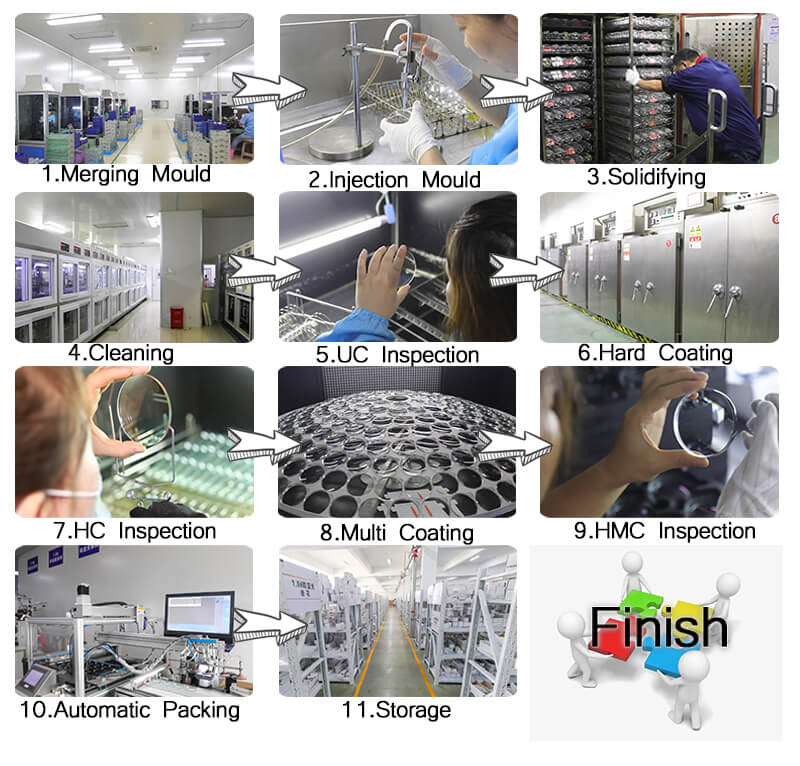Good User Reputation for Polycarbonate Eyeglasses - 1.67 MR-7 FSV High Index HMC optical lenses – Boris
Good User Reputation for Polycarbonate Eyeglasses - 1.67 MR-7 FSV High Index HMC optical lenses – Boris Detail:

Production Details
| Place of Origin: | Jiangsu | Brand Name: | BORIS |
| Model Number: | High Index Lens | Lenses Material: | MR-7 |
| Vision Effect: | Single Vision | Coating Film: | UC/HC/HMC/SHMC |
| Lenses Color: | White(indoor) | Coating Color: | Green/Blue |
| Index: | 1.67 | Specific Gravity: | 1.35 |
| Certification: | CE/ISO9001 | Abbe Value: | 32 |
| Diameter: | 80/75/70/65mm | Design: | Asperical |

MR-7 is generally used to make high-level lenses, with a refractive index of 1.677. Enjoy better visual quality than ever, even with height numbers. Compared to traditional lenses, the MR-7 is thinner and safer. MR-7 is also a material with better dyeing effect at present. Some colored lenses and myopia sunglasses are the best choice for this material.
Production Introduction
The refractive index of MR-7 and MR-10 materials reaches 1.67, and the production of high-level lenses is lighter and thinner. The thermal deformation temperature of MR-7 is 85 degrees, and that of MR-10 is 100 degrees. Both MR-7 and MR-10 are 1.67 refractive index lens materials. MR-7 is easier to dye than MR-10, so MR-7 is more suitable for myopia sunglasses, or fashion lenses. MR-10 lenses have higher hardness, better high temperature resistance, and higher processability. They are often used in workshops and custom lens processing.

Most of today’s spectacle lenses are based on resin lenses. Generally, in the case of poor heat resistance, the film on the surface of the lens will crack, which is caused by thermal expansion. Compared with the reflective film of the lens, the degree of thermal expansion of the base material is serious, and the degree of thermal expansion of the reflective film and the base material is different, and the film crack will occur.
Based on this consideration, MR-10 avoided this problem from the beginning of material design, and through continuous improvement, became a material with good heat resistance and low thermal expansion coefficient.
First, as the temperature increases, the thermal expansion coefficient tends to increase, but the thermal expansion coefficient of MR-10 is 25% smaller than that of general 1.67 materials. Compared with the general 1.67 material, MR-10 has less thermal expansion, is not prone to cracks, and is relatively less affected by heat.
Second, when the temperature is 95°C, a large number of cracks appear on the conventional 1.67 lens, while the MR-10 is completely unaffected.

Product Process

Product Video
Product detail pictures:



Related Product Guide:
Our well-equipped facilities and excellent excellent management throughout all stages of creation enables us to guarantee total buyer satisfaction for Good User Reputation for Polycarbonate Eyeglasses - 1.67 MR-7 FSV High Index HMC optical lenses – Boris , The product will supply to all over the world, such as: San Diego, Belgium, Vancouver, You can always find the products you need in our company! Welcome to inquire us about our product and anything we know and we can help in auto spare parts. We are looking forward to work with you for a win-win situation.
Problems can be quickly and effectively resolved, it is worth to be trust and working together.







